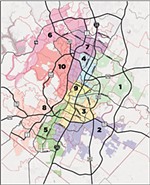Point Austin: Why Vote?
Vote on behalf of those denied their right to vote
By Michael King, Fri., Nov. 7, 2014

I'm writing this column prior to election night, in part to anticipate somewhat the next 24 hours of frenetic reporting and editing, and in part to step back for a little distance from the relentless "horse-race" reporting, whether it's about "Who controls the Senate?," "Who rules Texas?," or even "How many City Council candidates can dance on the head of a pin?"
It's not, alas, really a mystery who rules Texas. As U.S. District Judge Nelva Gonzales Ramos decided a few weeks ago, "[Senate Bill 14] creates an unconstitutional burden on the right to vote, has an impermissible discriminatory effect against Hispanics and African-Americans, and was imposed with an unconstitutional discriminatory purpose. The Court further holds that SB 14 constitutes an unconstitutional poll tax."
Testimony before Judge Ramos reflected convincingly that more than 600,000 otherwise eligible Texas voters would be disenfranchised by SB 14, imposed by a Republican-dominated Legislature that could not produce any serious evidence (two dubious cases among some 20 million votes) of the alleged "voter impersonation" that SB 14's Voter ID requirements were ostensibly intended to prevent. Yet as I write, stories have already begun accumulating of potential voters wrongly excluded by the new Texas law, recently upheld (temporarily) by the U.S. Supreme Court, presumably because a stay would have been too close to the election.
That unexplained ruling evoked a blistering dissent from Justice Ruth Bader Ginsburg (joined by Elena Kagan and Sonia Sotomayor), noting that it was the Texas foxes who were disrupting the voting henhouse. "In short, any voter confusion or lack of public confidence in Texas' electoral processes is in this case largely attributable to the state itself."
Even Republican Judge Richard Posner (who wrote a 2007 opinion that upheld Indiana's voter ID law) has since come to the understanding that such laws have only one purpose: to suppress the Democratic vote. As he put it, "There is only one motivation for imposing burdens on voting that are ostensibly designed to discourage voter-impersonation fraud, if there is no actual danger of such fraud, and that is to discourage voting by persons likely to vote against the party responsible for imposing the burdens."
The Texas Results
None of this, I know, is any help to voters disenfranchised this week in Texas. Has it affected the outcome? Excluding at the outset 4.5% of eligible voters is no small achievement, and more broadly affected are the many thousands of voters simply discouraged altogether by the cumbersome process. A Legislature that has persistently made it easier to buy and carry weapons works to find ways – on an "emergency" basis, no less – to make it more difficult to vote. Combined with all the other institutional obstacles to an engaged electorate – everything from midweek voting to privatized election funding to low minimum wages necessitating moonlighting for many workers – the voter ID law is one more significant slap in the face.
Political cynics dismiss the results of all this discouragement – "Politicians are all the same," goes the apathetic refrain – and insist that nothing would change in Texas under a Democratic administration. Yet even a cursory review of the last couple of decades at the Capitol belies that judgment. Just consider the fundamental government services most important to Texans of moderate means: education and health care. Gov. Rick Perry and his GOP colleagues have steadily underfunded higher education and gratuitously slashed funding for public schools; they have not only obstructed state funding for health care (witness Travis County's going-it-alone on a new medical school and teaching hospital), they have strenuously resisted federal health plans and federal Medicaid funding, even though it would mean billions for the state economy. Most disgraceful, in the name of defending "life," they have actively done everything they can to undermine reproductive health care for Texas women – even though that will mean more dangerous pregnancies, more state-funded births, and yes, more (and more dangerous) abortions.
A Responsibility to History
If none of that was sufficient reason for you to vote last week or on Tuesday, perhaps you have your reasons. For myself, I recall not only the long historical struggles to win the right to vote of originally excluded groups of people – those without property, women, recent immigrants, minorities of all kinds – but also the current relentless efforts of reactionary politicians, in Texas and elsewhere, to find new ways to suppress the vote. I voted to support progressive candidates and propositions and policies, yes; but win or lose, I voted to defy those doing their absolute best to discourage me and others from voting. I voted to defend the honest work of Judge Nelva Gonzales Ramos and Justice Ruth Bader Ginsburg. And I voted in honor of the 600,000 Texans who were officially prevented from voting, because of frightened Republican politicians who knew only too well that they were "likely to vote against the party responsible" for that tyranny.
Got something to say on the subject? Send a letter to the editor.












